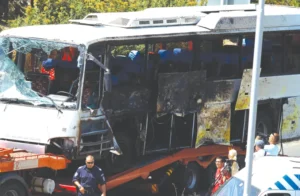It was a targeted Hezbollah suicide bombing attack on a bus carrying 42 Israelis, mostly young people, after they arrived at the airport.

July 18, 2022 marks 10 years since the Burgas bus bombing, a terrorist attack at Sarafovo Airport in Bulgaria that killed five Israelis and one Bulgarian while injuring 32 more Israelis.
The attack was believed to have been perpetrated by Hezbollah, a Lebanon-based terrorist group backed by Iran.
It was a targeted suicide bombing attack on a bus carrying 42 Israelis, mostly young people, after they arrived at the airport from Tel Aviv.
Background
Much of the details prior to the bombing are unclear, and the perpetrators connected to it, while identified, have not been apprehended.
What is known for sure is the attack itself and the death toll.
A group of Israelis arrived in the Black Sea resort city of Burgas on July 18, 2012. They had got on the Israeli tour bus outside the airport and readied to head to the hotel.
An explosion soon followed after the detonation of a bomb, identified in 2020 to have been an ammonium nitrate-based explosive, killing six people plus the suicide bomber.
The casualties were mostly tourists, including one pregnant Israeli woman, as well as the Bulgarian-Muslim bus driver.
“There are clear signs that say Hezbollah is behind the Burgas bombing.”
Tsvetlin Yochev
The investigation and the Hezbollah connection
While many were quick to label it a terrorist attack, there were other possible theories at first. But more evidence soon ruled other factors out.
Security footage would later determine that the culprit possessed a fake US ID.
Though Bulgarian officials warned that an investigation may take years, it took only a year before evidence emerged linking it to Hezbollah, though Israel was quick to blame Hezbollah and Iran for it within days after the attack. However, to this day, both Hezbollah and Iran deny all allegations.
“There are clear signs that say Hezbollah is behind the Burgas bombing,” then-Bulgarian interior minister Tsvetlin Yochev said in 2013.
That same year, then-Bulgarian foreign minister Nikolay Mladenov and then-Israeli prime minister Benjamin Netanyahu both confirmed the solid evidence linking Hezbollah to the Burgas attack.
Bulgaria’s investigation into the Burgas bombing even led to the EU placing Hezbollah’s armed wing on its blacklist.
In 2014, Bulgaria announced it had used DNA testing to identify the bomber: Mohamad Hassan El-Husseini, a Lebanese-French citizen.
Two other individuals were also linked to the attack, and Bulgaria asked Lebanon to extradite them, though without success.
However, they were tried in absentia and, in 2020, sentenced to life in prison, though their whereabouts to this day still remains unknown.
Despite the evidence pointing to Hezbollah, Bulgaria never officially charged the terrorist group with the bombing, something The Jerusalem Post revealed in an exclusive report in 2018.
Instead, the prosecutor indicted the two men allegedly involved in the attack as if they were terrorists or even regular criminals who acted without connection to an organization. The word “Hezbollah” never appeared in the indictment.
Earlier, the Bulgarian prosecution stated repeatedly that they had no evidence to link the two to Hezbollah. However, on September 17, 2020, after the trial concluded but before the sentencing, the prosecutor revealed that in fact, there was significant evidence linking Hezbollah to the Burgas bus bombing.
The prosecutor proceeded to detail the evidence in the court record, but since the conviction had already been set, the court said its hands were tied and that it could not reopen the case to charge Hezbollah and add terrorism charges.
Though there are many theories regarding Bulgaria’s reluctance to call out Hezbollah for this, ultimately it isn’t exactly known why this evidence was never brought forth by the prosecution in the first place.
This remains a sore subject for many in Israel, especially the victims’ families. But nonetheless, Bulgarian-Israeli relations remain unshaken to this day.
In honor of the 10th anniversary of the bombing, the Israeli Embassy in Bulgaria changed its picture on social media to a stylized number 10.
